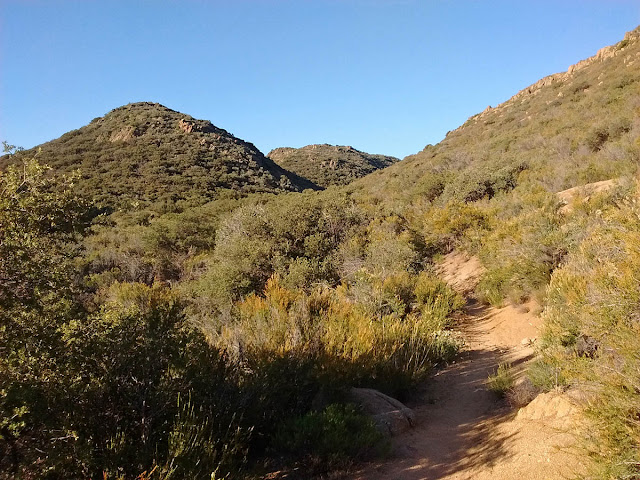From San Diego at sea level it is 54 miles east on Interstate 8 to Laguna Summit at just over 4000 feet. Now exit at Hwy 8 mile marker 54 on Kitchen Creek Road and it is 2.5 miles to the Pacific Crest Trail (PCT) parking area. This is the most reliable spot in San Diego County, indeed all of California, for finding Gray Vireos.
After living in San Diego County now for 21 months, I finally made the rather long trip (80 miles, 1 hour and 20 minutes from home) specifically to see this bird.
On June 14, 2015 I rose at 4:30 a.m. and left home in San Marcos a
bit after 5:00 a.m. I filled with gas then headed south on the 15 to the 8 and up, up, up. The
June Gloom overcast stayed with me until I neared Pine Valley at about 3000 feet elevation. Then the newly risen
sun shown directly in my eyes as I continued east. I arrived at the Pacific Crest Trail
pullout at 6:30 a.m. and it was very birdy. In fact,
I found 28 species here over the next 2 hours, as the temperature steadily climbed from 60F to 90F.
Within 15 minutes of arrival, between 500 and 1000 feet west on the PCT (Southbound) I heard my target species. There were 2 singing Gray Vireos and I photographed one of them at quite a distance up the hillside.
The bird was rather all-over gray. The under tail coverts and lower belly
whiter. There was a thin white eye ring and a single faint wing bar.
 |
Gray Vireo. Kitchen Creek, Pacific Crest Trail, San Diego County, California. June 14, 2015. Greg Gillson.
My 300th San Diego County bird! |
The voice was a loud repeated series of 4 well-spaced sweet sliding whistles, one slightly buzzy, one higher: "suweet, dzuwee, suweet, suwee." It sounded quite similar to Cassin's Vireo.
Compared to surrounding areas that don't seem to have Gray Vireos,
the chaparral here is thicker and taller, interspersed with more boulders, and in a steeper canyon. There was a little creek down a couple hundred feet, but the vireo was up in the dry chaparral.
 |
| Looking down on Kitchen Creek |
Chaparral was composed of dozens of species of large shrubs, smaller shrubs and flowers. Some I saw and think I may have identified correctly (guessed by picture-matching) using
this website are: Big Berry Manzanita, Common Sagebrush, Golden Bowl Mariposa, Indian Paintbrush, Fringed Spineflower, Yucca, Toyon, Cholla, Chamas. Here is another page on
common plants and animals of California's chaparral.
 |
| Wrentit |
Typical birds included Wrentit, California Thrasher, Bewick's Wren, Spotted Towhee, California Towhee, Costa's Hummingbird, Ash-throated Flycatcher, and Black-chinned Sparrow. A Mountain Quail squawked once early.
 |
| Costa's Hummingbird |
One bird here that I rarely see is Scott's Oriole. It sings like a Western Meadowlark... or maybe like two meadowlarks harmonizing together--such a rich bright song coming from a dry, dull landscape.
 |
| Scott's Oriole |
Way down on the creek I saw a couple of California Quail and some Lawrence's Goldfinches. The calls of both Rock and Canyon Wrens echoed down the canyon. Not really the best habitat--a Cactus Wren chugged away across the canyon, unseen. That made 5 wren species within a quarter mile!
 |
| Black-headed Grosbeak |
Birds of
Kitchen Creek Road are on this hotspot list from eBird. It includes 143 species from the first 5 miles, from Interstate 8 to the gate.
 |
| Horned Lizard |
At mile post 4.5 on Kitchen Creek Road is Cibbets Flat Campground. The oaks here add Oak Titmouse, White-breasted Nuthatch, Western Bluebird, House Wren, Acorn Woodpecker, Nuttall's Woodpecker, Black-chinned Hummingbird, Western Wood-Pewee, Lawrence's and Lesser Goldfinch, and Steller's Jays to the other chaparral birds.
 |
| Oak Titmouse at Cibbets Flat Campground |
 |
| Acorn Woodpecker at Cibbets Flat Campground. |




No comments:
Post a Comment
I really want to hear from you! I've changed settings (again) in order to try to make commenting easier without opening it up to spammers. Please note, however, that comments to posts older than 14 days will be moderated. Thank you.